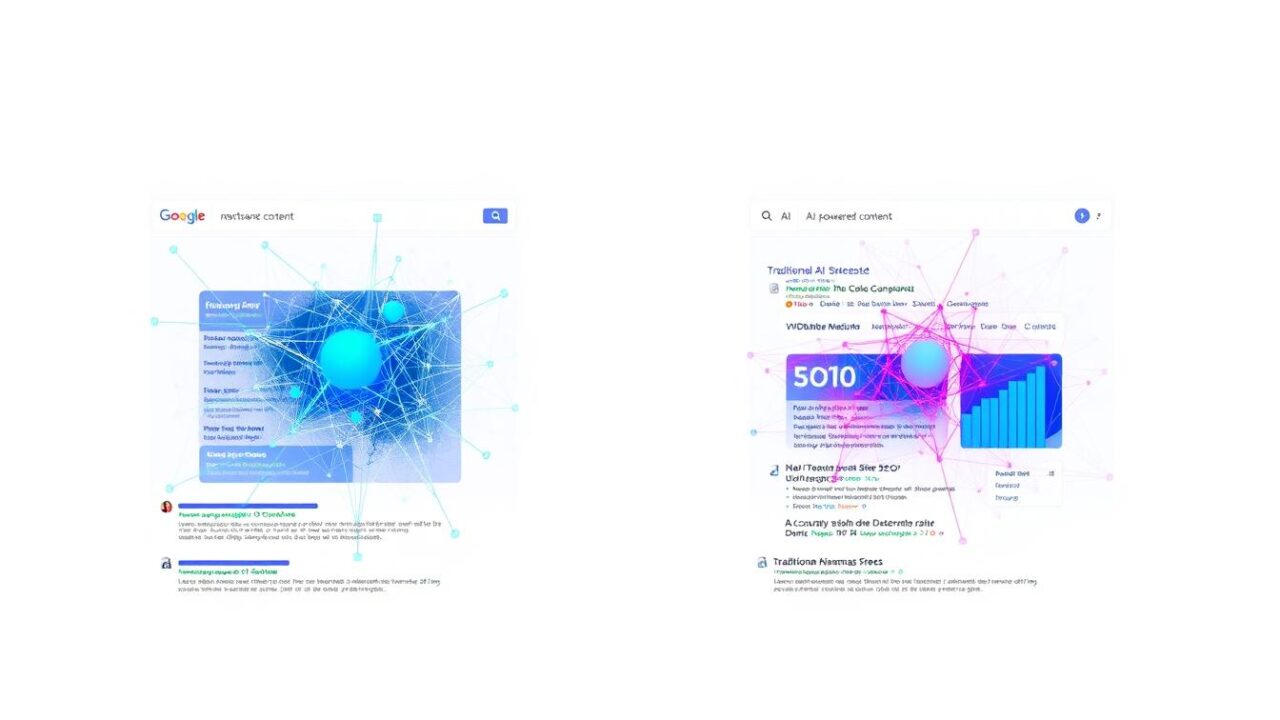As AI search tools like Google’s Search Generative Experience (SGE), ChatGPT, and Perplexity gain traction, SEO professionals face a critical question: How do we adapt our strategies to remain effective in this new era? This comprehensive analysis explores the current state of AI SEO, its impact on traditional practices, and actionable strategies for navigating this evolving landscape.
Understanding AI SEO: Beyond Keywords and Backlinks
AI SEO refers to search engine optimization strategies specifically designed for AI-powered search engines and features. Unlike traditional SEO, which primarily focuses on keywords, backlinks, and technical elements, AI SEO emphasizes semantic understanding, user intent, contextual relevance, and content quality at a much deeper level.
The fundamental difference lies in how search engines process and understand content. Traditional search algorithms rely heavily on matching keywords and evaluating backlink profiles. In contrast, AI search systems like Google‘s SGE, powered by large language models (LLMs), comprehend content more like humans do—understanding context, nuance, and relationships between concepts.
This shift demands a more sophisticated approach to content creation and optimization. While traditional SEO elements remain important, they now serve as the foundation rather than the complete strategy. The new paradigm requires content that demonstrates genuine expertise, answers questions comprehensively, and provides unique value that AI systems can recognize and reward.
AI SEO vs. Traditional SEO: Key Differences
| Aspect | Traditional SEO | AI SEO |
| Content Evaluation | Keyword density, placement, and matching | Semantic understanding, topical depth, and contextual relevance |
| Search Intent | Basic categorization (informational, transactional, navigational) | Nuanced understanding of specific user needs, context, and follow-up questions |
| Content Structure | Optimized for scanning (headers, bullets, etc.) | Optimized for extraction and synthesis by AI systems |
| Ranking Factors | Relatively stable and identifiable | Dynamic, contextual, and often opaque |
| Measurement | Position tracking, click-through rates, traffic | Citation frequency, featured snippets, zero-click satisfaction |
| Optimization Focus | Page-level optimization | Entity-level and passage-level optimization |
The Changing Role of Keywords
Keywords remain important but in a fundamentally different way. Rather than focusing on exact-match keywords and density, AI SEO requires understanding the semantic field around topics. This means identifying related concepts, questions, and entities that demonstrate comprehensive coverage of a subject.
For example, an article about “sustainable gardening” would need to naturally incorporate related concepts like soil health, water conservation, native plants, and biodiversity—not because they’re keywords to target, but because they’re integral to a thorough discussion of the topic.
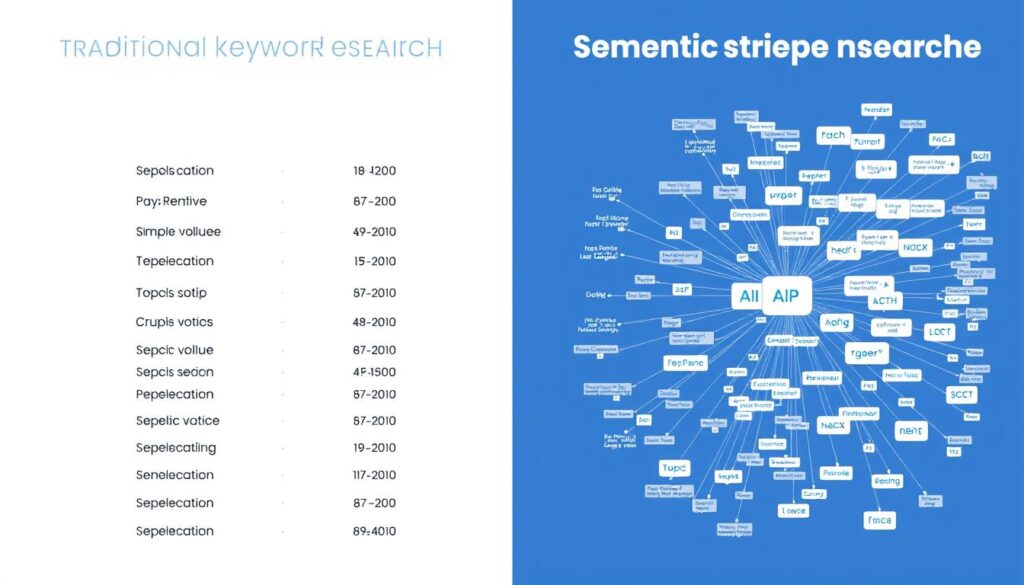
Backlinks in the AI Era
While backlinks continue to signal authority, AI search systems evaluate them with greater sophistication. The context of links, the semantic relevance between linking sites, and the overall entity relationships matter more than raw link counts. A single highly relevant link from an authoritative source in your specific niche may carry more weight than dozens of generic links.
Additionally, AI systems can better detect manipulative link building tactics by understanding the context and natural patterns of citations across the web. This makes authentic, editorially-given links even more valuable while diminishing returns from artificial link building schemes.
Technical SEO Evolution
Technical SEO remains crucial but with new priorities. Site speed, mobile-friendliness, and secure connections are still fundamental, but structured data has become increasingly important. By implementing schema markup, you help AI systems understand your content’s context and purpose.
Additionally, technical elements that improve content accessibility—like clear site architecture, proper heading structure, and descriptive alt text—help AI systems better comprehend and categorize your content. These elements serve dual purposes: improving user experience while making content more machine-readable.
Stay Ahead of AI SEO Change
User Migration to AI Search: Changing Behaviors

Users are increasingly turning to AI-powered search experiences, drawn by their ability to provide direct answers rather than lists of links. This behavioral shift is reshaping expectations about how search should function and what constitutes a satisfying search experience.
Why Users Prefer AI Search
Several factors are driving user adoption of AI search tools:
- Efficiency: AI search often eliminates the need to visit multiple websites, synthesizing information into comprehensive answers.
- Conversational Interface: Natural language queries feel more intuitive than keyword-based searches.
- Follow-up Capability: AI search maintains context, allowing for follow-up questions without starting over.
- Personalization: AI systems learn user preferences over time, delivering increasingly relevant results.
- Multimedia Integration: Modern AI search can process and explain images, videos, and other media types.
Adoption Rates and Trends
While precise adoption statistics vary by platform, the trend is clear. According to recent data, approximately 25% of Google searches now trigger AI-powered features, with that number growing steadily. ChatGPT reached 100 million users faster than any consumer application in history, and search-focused AI tools like Perplexity are seeing rapid growth.
Demographic analysis shows that younger users (18-34) are adopting AI search at nearly twice the rate of older demographics, suggesting this shift will accelerate as these users become the dominant consumer group. Additionally, professional and academic users show particularly high adoption rates, using AI search for research and information synthesis.
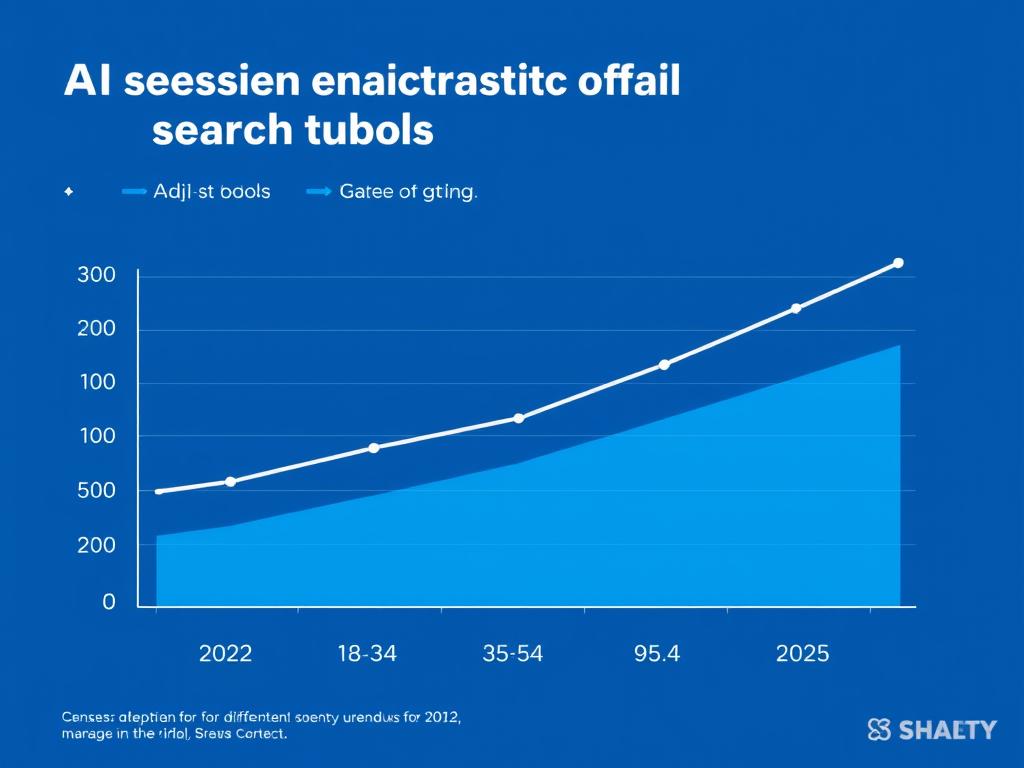
The Zero-Click Search Evolution
AI search accelerates the “zero-click” trend, where users get their answers directly in search results without visiting websites. This represents both a challenge and an opportunity for content creators. While direct traffic may decrease, being cited as a source in AI-generated answers can build brand authority and recognition.
This shift requires rethinking success metrics. Traditional metrics like organic traffic may become less relevant, while new metrics like citation frequency, featured snippet inclusion, and brand mention tracking gain importance.
The AI Search Market Landscape
Key Players and Platforms
Google SGE
Google’s Search Generative Experience represents the evolution of traditional search, integrating AI-generated answers above conventional results. With Google’s dominant market position, SGE has the potential to reshape the entire search ecosystem.
Key Features: AI Overviews, follow-up questions, multimedia understanding
Microsoft Bing AI
Powered by OpenAI technology, Bing AI combines traditional search with conversational capabilities. Microsoft’s integration with Windows and Office gives it unique advantages in certain contexts.
Key Features: ChatGPT integration, creative mode, citation links
Specialized AI Search
Dedicated AI search engines like Perplexity, You.com, and Neeva focus exclusively on AI-first experiences. These platforms often offer deeper integration with various knowledge sources and specialized capabilities.
Key Features: Real-time information, specialized knowledge domains, API integrations
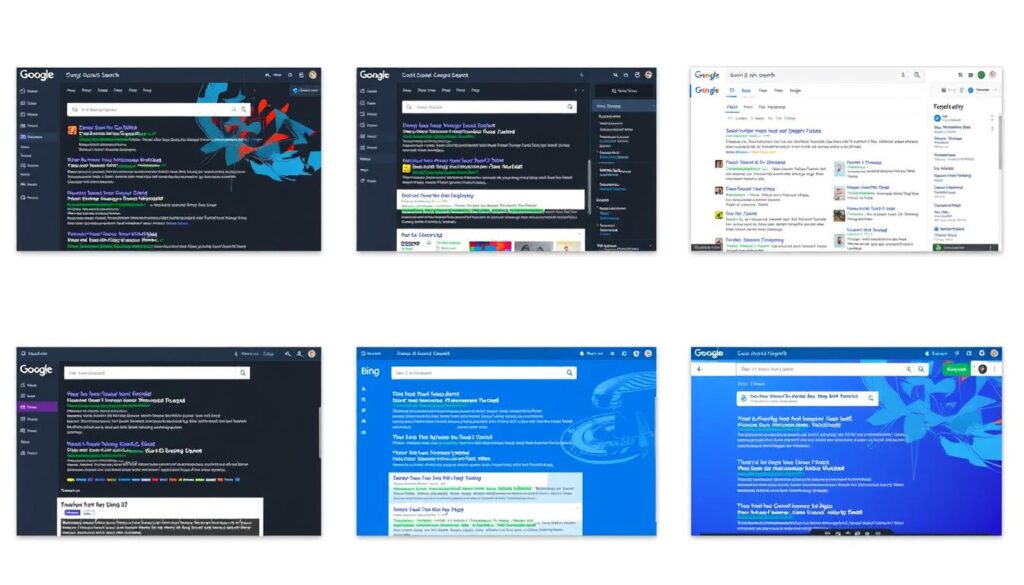
Monetization Challenges for Publishers
The rise of AI search creates significant monetization challenges for content publishers. When AI systems extract and synthesize information without driving traffic to source websites, traditional advertising and affiliate revenue models are disrupted.
Publishers are exploring several adaptation strategies:
- Premium Content Models: Creating deeper, more valuable content that AI systems can reference but not fully replace
- Licensing Agreements: Negotiating with AI providers for content usage rights
- First-Party Data Focus: Building direct audience relationships that don’t depend on search traffic
- AI-Native Formats: Developing content specifically designed to perform well in AI search while driving engagement
The most successful publishers are those viewing AI not just as a threat but as a new distribution channel requiring its own optimization strategies. By understanding how AI systems evaluate, extract, and present content, publishers can adapt their approaches to maintain visibility and value in this changing landscape.
Evaluate Your AI Search Readines
Optimizing for AI Training Data: The New Frontier

A crucial aspect of AI SEO is understanding how websites become part of AI training datasets. While search engines have always indexed content, AI systems learn from content in fundamentally different ways, creating new considerations for optimization.
How AI Systems Learn from Websites
AI search systems typically learn from web content through several mechanisms:
- Pre-training: Large language models are initially trained on vast datasets that include web content, books, and other text sources.
- Fine-tuning: Models are refined using more specific, high-quality datasets, often including authoritative web content.
- Retrieval-Augmented Generation (RAG): Many AI search systems retrieve fresh web content in real-time to supplement their knowledge and provide up-to-date information.
- Reinforcement Learning from Human Feedback (RLHF): Human evaluators help train models to prefer certain types of content and sources over others.
Understanding these mechanisms helps content creators optimize for inclusion in these learning processes, increasing the likelihood of being cited in AI-generated answers.
Strategies for Inclusion in AI Training Data
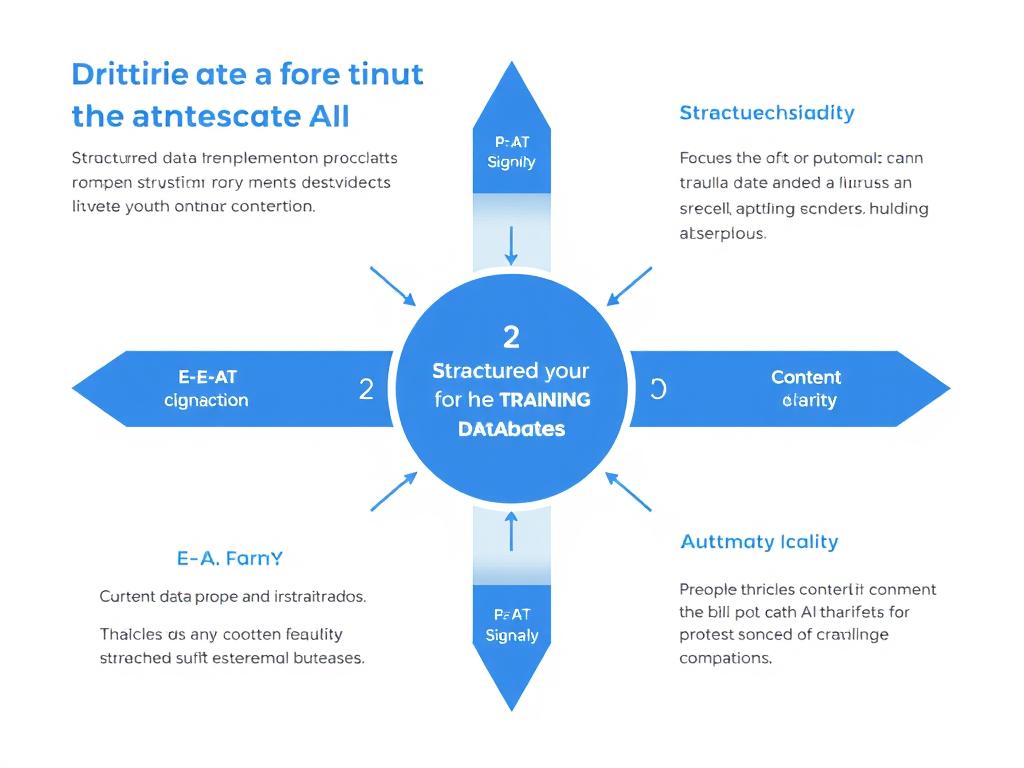
Several strategies can improve your content’s chances of being included in AI training datasets and subsequently cited in search results:
- Structured Data Implementation: Comprehensive schema markup helps AI systems understand your content’s context, purpose, and relationships.
- E-E-A-T Optimization: Demonstrating Experience, Expertise, Authoritativeness, and Trustworthiness through clear author credentials, references, and accurate information.
- Content Clarity and Organization: Well-structured content with clear headings, concise paragraphs, and logical flow is easier for AI systems to process and learn from.
- Authoritative Sourcing: Citing reputable sources and providing evidence for claims signals quality to AI systems.
- Comprehensive Coverage: Addressing topics thoroughly, including related concepts and questions, increases the value of your content for AI training.
Ethical Considerations and Opt-Out Options
The use of web content for AI training raises important ethical questions about consent, attribution, and compensation. Some content creators may prefer to limit how AI systems use their work.
Several mechanisms exist for controlling AI access to your content:
- robots.txt Directives: Some AI crawlers respect specific directives in robots.txt files.
- AI-Specific Meta Tags: Emerging standards like
noaitags signal preferences regarding AI usage. - Licensing Terms: Explicit terms of service can legally restrict how your content is used for AI training.
However, the effectiveness of these measures varies by platform, and the legal landscape is still evolving. Content creators should stay informed about developments in this area and make deliberate choices about how their work interacts with AI systems.
The Impact on SEO Agencies: Adaptation and Evolution

SEO agencies face perhaps the most significant disruption from AI search, requiring fundamental shifts in service offerings, expertise, and client education. Those that adapt effectively will find new opportunities, while those that cling to outdated practices risk obsolescence.
New Service Offerings and Expertise
Forward-thinking agencies are developing new service lines specifically for the AI search era:
Emerging AI SEO Services
- AI Content Auditing: Evaluating how content performs in AI search results and identifying improvement opportunities
- Passage Optimization: Refining specific content sections to increase citation likelihood
- Entity Strategy: Developing comprehensive approaches to entity recognition and relationship building
- AI Search Monitoring: Tracking brand mentions and content usage across AI platforms
- Prompt Engineering: Creating strategies for how users might query AI about relevant topics
Required Technical Skills
- Natural Language Processing: Understanding how AI systems process and understand text
- Structured Data Expertise: Advanced implementation of schema and other semantic markup
- API Integration: Connecting with AI platforms for testing and monitoring
- Data Analysis: Interpreting complex performance metrics beyond traditional rankings
- Content Strategy: Developing comprehensive, semantically rich content plans
Pricing Models and Client Education
The AI search revolution is also changing how agencies price their services and communicate value to clients. Traditional metrics like keyword rankings become less meaningful when AI results vary by user and context.
Agencies are adapting with:
- Value-Based Pricing: Focusing on business outcomes rather than ranking positions
- Comprehensive Reporting: Developing new metrics that capture AI search performance
- Educational Components: Helping clients understand the changing landscape and set appropriate expectations
- Longer Engagements: Shifting from quick-win tactics to strategic partnerships
Client education has become particularly important, as many businesses still evaluate SEO success through traditional metrics. Effective agencies are proactively guiding clients through this transition, explaining both the challenges and opportunities of AI search.
Risks of Outdated Tactics
Effective AI SEO Approaches
- Creating comprehensive, authoritative content
- Implementing structured data and semantic markup
- Building genuine expertise and authority signals
- Focusing on user needs and search intent
- Developing entity-based strategies
Outdated Tactics to Avoid
- Keyword stuffing and density manipulation
- Thin content optimized only for specific queries
- Artificial link building schemes
- Focusing solely on ranking positions
- Ignoring semantic relationships between topics
Agencies that continue to rely on outdated tactics face significant risks. AI systems are much better at detecting manipulation than traditional algorithms, and penalties can be severe. Moreover, as client understanding grows, agencies that can’t demonstrate value in the AI search context will struggle to retain business.
Master AI SEO Strategies
Practical AI SEO Strategies for Implementation
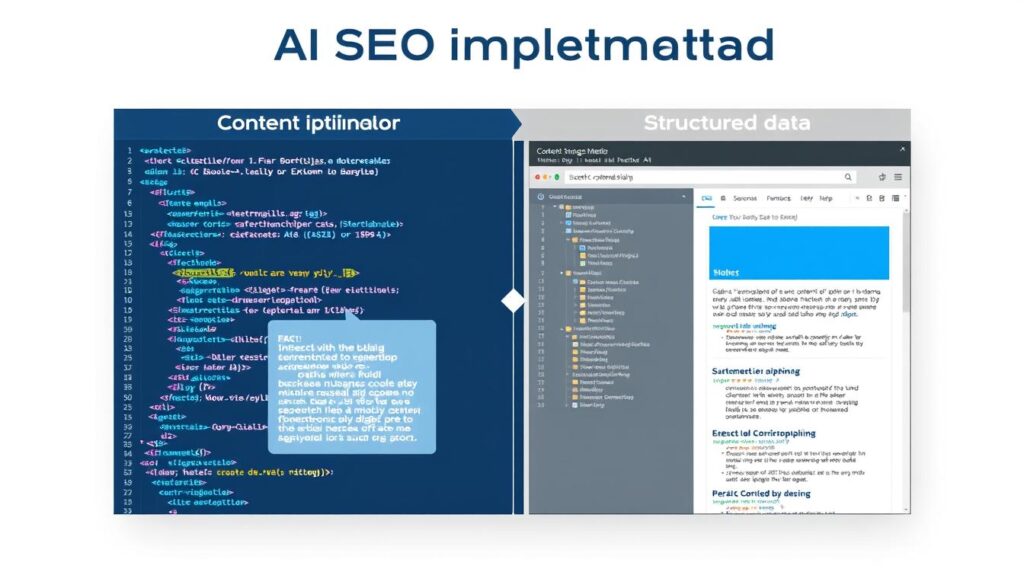
Moving beyond theory, let’s explore practical strategies that organizations can implement today to improve their performance in AI search results.
Content Optimization for AI Understanding
Content remains at the heart of SEO, but AI search requires specific optimization approaches:
- Comprehensive Topic Coverage: Create content that thoroughly addresses all aspects of a topic, including related questions and subtopics.
- Clear Information Architecture: Structure content with logical headings, concise paragraphs, and appropriate formatting to aid AI comprehension.
- Factual Precision: Ensure all statements are accurate and verifiable, as AI systems increasingly fact-check content.
- Explicit Entities: Clearly identify people, places, organizations, and concepts to help AI systems understand relationships.
- Question-Answer Format: Where appropriate, structure content to directly answer likely user questions.
“The most successful content in AI search doesn’t just contain the right keywords—it demonstrates genuine understanding of the topic and anticipates what users truly need to know.”
Technical Implementation for AI Visibility
Several technical elements can significantly improve your content’s performance in AI search:
Structured Data Implementation
Implement comprehensive schema markup to help AI systems understand your content’s context and purpose. Focus on:
- Article, FAQPage, and HowTo schemas for content
- Product and Offer schemas for e-commerce
- LocalBusiness for location-based businesses
- Person and Organization for entity recognition
- WebPage and BreadcrumbList for navigation context
E-E-A-T Signals
Implement technical elements that demonstrate Experience, Expertise, Authoritativeness, and Trustworthiness:
- Clear author attribution with credentials
- Dated content with visible update history
- Comprehensive “About” and “Contact” information
- Secure site with HTTPS implementation
- Proper citation and reference linking
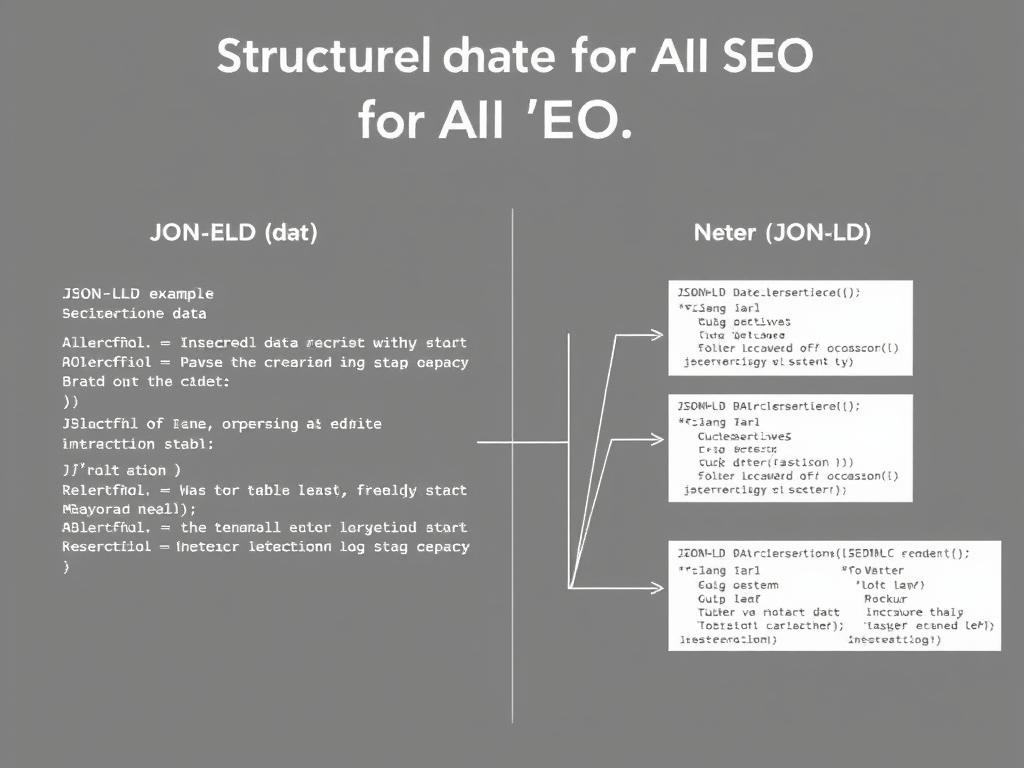
Measurement and Adaptation
Measuring success in AI search requires new approaches and metrics:
- AI Citation Tracking: Monitor when and how your content is cited in AI-generated answers.
- Brand Mention Monitoring: Track brand mentions across AI platforms even when not linked.
- Featured Snippet Performance: Analyze which content appears in featured snippets and AI overviews.
- User Journey Analysis: Understand how users interact with your site after AI search interactions.
- Competitive AI Presence: Compare your visibility in AI results against competitors.
Several specialized tools are emerging to help with these measurements, including AI search simulators, citation trackers, and enhanced analytics platforms. Regular testing and adaptation based on these insights is essential for maintaining and improving performance.
AI SEO in Action: Case Studies
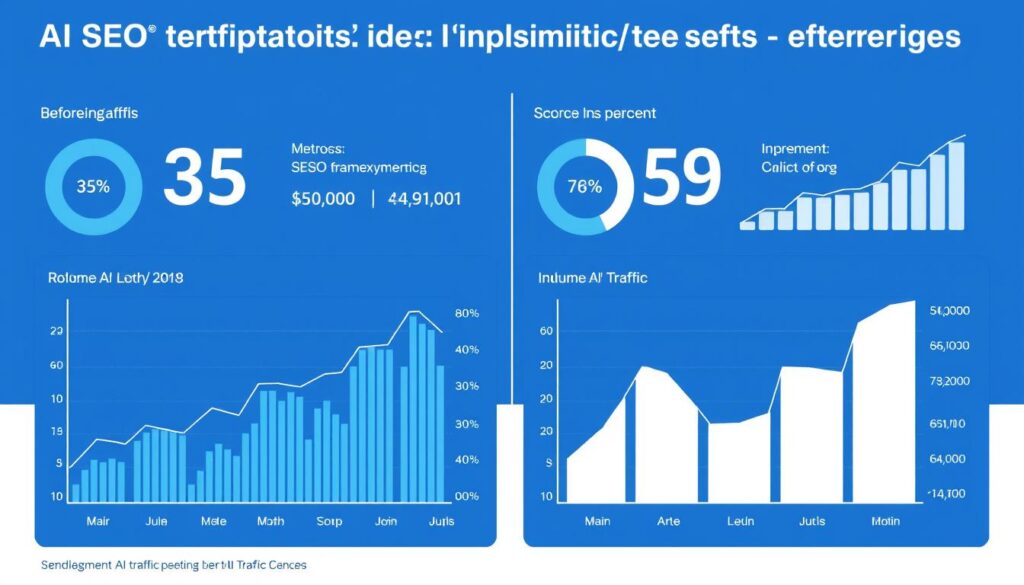
Case Study 1: E-commerce Product Visibility
A mid-sized e-commerce retailer specializing in sustainable home goods was struggling with visibility in AI search results. Despite strong traditional SEO performance, their products rarely appeared in AI-generated shopping recommendations.
Implementation Strategy
- Enhanced product schema with comprehensive attribute coverage
- Created detailed product guides addressing common questions
- Implemented review structured data with semantic analysis
- Developed comparison content highlighting unique features
- Added expert commentary on sustainability aspects
Results
- 68% increase in product mentions in AI shopping responses
- 42% improvement in featured snippet inclusion
- 23% higher conversion rate from AI-referred traffic
- Expanded visibility across multiple AI platforms
- New customer segment growth from sustainability searches
Case Study 2: Local Service Business Adaptation
A regional HVAC service provider found that traditional local SEO tactics were becoming less effective as more customers used AI assistants to find service providers. They needed to adapt their strategy to maintain visibility in this changing landscape.
Implementation Strategy
- Created comprehensive FAQ content addressing specific service questions
- Enhanced LocalBusiness schema with detailed service offerings
- Developed problem/solution content for common HVAC issues
- Implemented service area structured data for geographic relevance
- Added expert technician profiles with credentials and specializations
Results
- 54% increase in business mentions in local service queries
- 37% growth in direct appointment bookings from AI assistants
- Expanded service area recognition in AI responses
- Improved competitive positioning against larger national chains
- New customer acquisition from specialized service queries
These case studies demonstrate that successful AI SEO requires a holistic approach combining technical implementation, content strategy, and continuous measurement. Organizations that view AI search as an opportunity rather than a threat can achieve significant competitive advantages.
Future Trends: The Evolving AI SEO Landscape

The AI search landscape continues to evolve rapidly. Understanding emerging trends can help organizations prepare for future developments and maintain competitive advantage.
Multimodal Search Integration
AI search is expanding beyond text to incorporate multiple modes of information:
- Visual Search: AI systems increasingly understand and respond to images as part of queries.
- Voice Integration: Voice search is becoming more sophisticated, with AI understanding natural conversation.
- Mixed-Media Queries: Users can combine text, images, and voice in single search sessions.
This evolution requires content creators to think beyond text optimization. Visual assets, audio content, and interactive elements will need their own optimization strategies to remain visible in multimodal AI search.
Regulatory Developments
The regulatory landscape around AI search is developing rapidly, with several areas of focus:
- Content Attribution: Requirements for AI systems to properly cite sources
- Training Data Transparency: Disclosure of what content is used for AI training
- Opt-Out Mechanisms: Standardized ways for content creators to control AI usage
- Compensation Models: Potential frameworks for compensating content creators
Organizations should monitor these developments closely, as they may create both obligations and opportunities. Preparing for compliance while advocating for fair treatment of content will be increasingly important.
Hybrid Human-AI Workflows
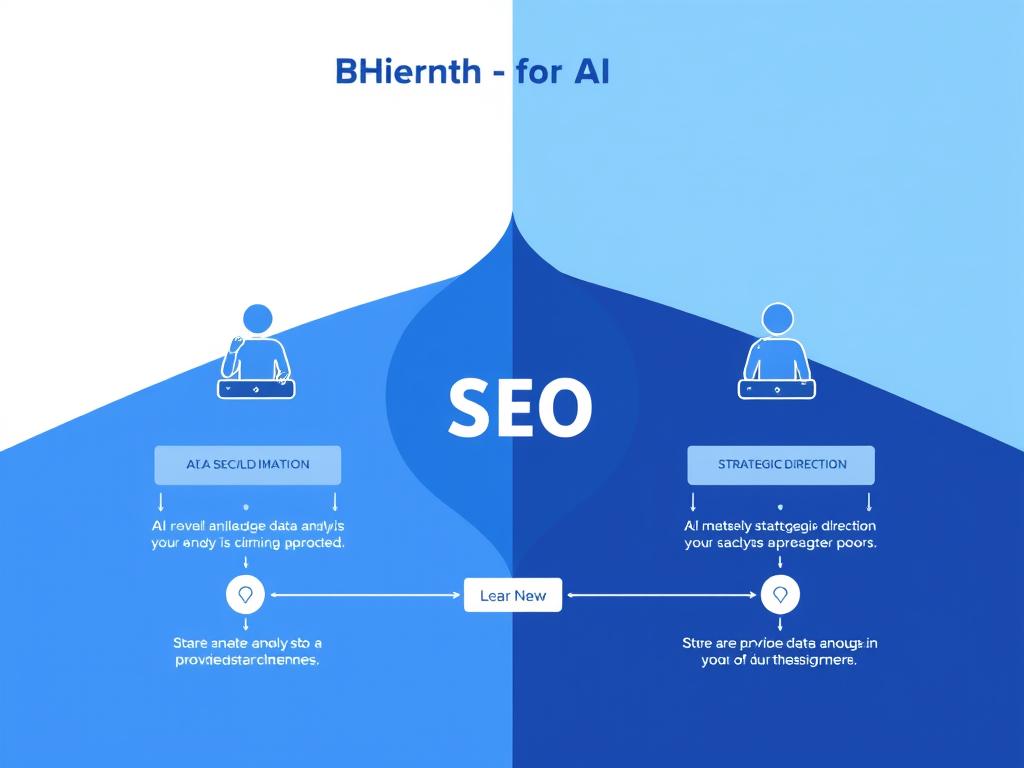
The most effective future SEO strategies will likely combine AI capabilities with human expertise:
- AI-Assisted Content Creation: Using AI to generate drafts and outlines while humans provide expertise and refinement
- Automated Technical Optimization: Implementing AI systems to handle routine technical SEO tasks
- Human-Guided Strategy: Leveraging human creativity and insight for strategic direction
- Continuous Learning Systems: Developing workflows where human and AI components improve together over time
Organizations that develop effective hybrid workflows will gain significant advantages in efficiency and effectiveness. This requires not just technological implementation but cultural adaptation to new ways of working.
Conclusion: Embracing the AI SEO Revolution
The rise of AI search represents the most significant shift in SEO since the introduction of mobile-first indexing or perhaps even the launch of Google itself. This transformation challenges fundamental assumptions about how search works and how websites should optimize for visibility.
Yet within this disruption lies tremendous opportunity. Organizations that adapt quickly and thoughtfully can gain significant advantages, reaching users in new ways and building authority in AI-mediated information landscapes.
Success in this new era requires a balanced approach: maintaining technical excellence while developing deeper content expertise; leveraging AI tools while preserving human insight; optimizing for machines while ultimately serving human needs.
The organizations that will thrive are those that view AI not as a threat to traditional SEO but as an evolution of how we connect valuable content with the people who need it. By embracing this perspective and implementing the strategies outlined in this article, you can position your organization for success in the AI search era.

Navigate the AI SEO Revolution with Confidence
Join our community of forward-thinking SEO professionals adapting to the AI era. Get exclusive access to case studies, implementation guides, and expert analysis.
Frequently Asked Questions About AI SEO
Is traditional SEO still relevant in the AI search era?
Yes, traditional SEO remains relevant but serves as a foundation rather than a complete strategy. Technical elements like site speed, mobile-friendliness, and secure connections are still essential. Backlinks continue to signal authority, though their evaluation is more sophisticated. Keywords matter but in the context of semantic understanding rather than exact matching. The most effective approach combines traditional SEO fundamentals with AI-specific optimizations.
How can I measure success in AI search?
Measuring AI search success requires new metrics beyond traditional rankings and traffic. Key measurements include citation frequency in AI-generated answers, brand mention tracking across AI platforms, featured snippet inclusion, and analysis of user journeys that begin with AI search. Several specialized tools are emerging to help with these measurements, including AI search simulators and enhanced analytics platforms that track zero-click interactions.
Will AI search completely replace traditional search results?
While AI search is growing rapidly, it’s unlikely to completely replace traditional search results in the near term. Different query types benefit from different result formats, and many users still prefer the traditional link-based approach for certain searches. What’s more likely is a hybrid environment where AI-generated answers become increasingly prominent while traditional results remain available. The balance will likely shift toward AI over time, especially for informational queries.
How can small businesses compete in AI search without large resources?
Small businesses can compete effectively in AI search by focusing on niche expertise, local relevance, and content quality rather than quantity. Implementing comprehensive structured data, creating genuinely helpful content that addresses specific user needs, and building authentic authority in a defined specialty area can yield strong results. Small businesses often have advantages in authenticity and specialized knowledge that AI systems increasingly value, even without large content production resources.
What skills should SEO professionals develop for the AI era?
SEO professionals should develop a blend of technical and strategic skills for the AI era. Technical skills include understanding of natural language processing, structured data implementation, API integration, and data analysis beyond traditional metrics. Strategic skills include content strategy with semantic focus, entity relationship mapping, user intent analysis, and the ability to translate AI search performance into business value. Additionally, the ability to effectively communicate these complex concepts to stakeholders is increasingly important.
Want to hire me as a Consultant? Head to Channel as a Service and book a meeting.

